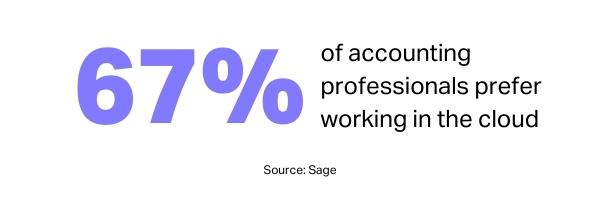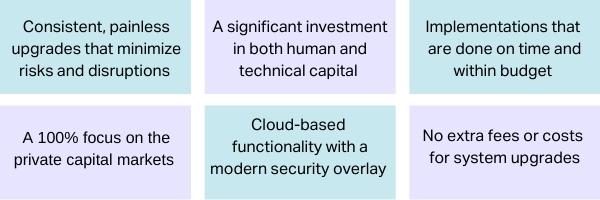
By: Allvue Team
April 11, 2023
Software upgrades that force fund administrators and general partners to play version “catch up” are less than ideal for everyone, including LPs. Instead, upgrades that provide valuable new functionality and can be implemented seamlessly and effortlessly will set the standard in private capital technology.
When facing the potential task of updating private equity software, here are some questions to ask and best practices to consider.
1. Consider whether you need an update or an upgrade
System upgrades are a fact of life for any technology provider and their clients. New functionality, security enhancements, updated technology, and performance tweaks are all continuous initiatives vendors will (or should) address over time to ensure continued improvement.
How they go about it and at what cost, though, can be very different across technology providers. In the extremely complex world of alternative investments, there can be significant ramifications for fund managers, LPs, and fund admins alike depending on the magnitude of changes executed as part of the upgrade.
READ MORE: WHAT IS CO-SOURCING?
What is the difference between a software update and a software upgrade?
A software update includes bug fixes, security patches, and other small improvements. A software upgrade fundamentally changes the version of the software. Experts say updates should happen once a month or more, and upgrades should be considered at least once every 18 months.
Upgrades are bigger, more complex, and can often involve significant changes in how a client interacts with the interface. Moving from a desktop, locally installed, “on-prem” version of the software to a cloud-based environment is one example.

There are risks associated with major updates, especially if the vendor (or the client) takes them lightly. Risks for clients can include:
- Significant downtime
- Data corruption
- Functionality breaks
- Unanticipated costs
- Corrupted user permissions
- Broken integrations
- Disruption in workflow and configuration continuity
- Hardware incompatibility
For fund managers that depend on their fund accounting software and investor portal for strict reporting deadlines, significant downtime just isn’t an option. Getting K-1s out or initiating a capital call are just two examples of fund accounting fundamentals where significant downtime can cause major disruptions for both fund managers and limited partners.
READ MORE: Understanding Private Equity Fund Accounting
2. Determine if the upgrade will bring value
Over time, some vendors end up running multiple versions across their client base (including older, legacy software). This practice stretches the vendor’s resources in terms of support and maintenance. Upgrades from “sunsetting” older versions often ensue, putting clients in the unenviable position of having to plan for any of the aforementioned risks and costs associated with an upcoming major upgrade.
The real pain for clients, though, is when an upgrade doesn’t involve any real improvements or enhancements from the client’s point of view. In some instances, a forced upgrade only gets you back to the starting line. Often, this happens when vendors have neglected to properly invest in their platform. For vendors that serve multiple lines of business outside of their private capital solutions, this isn’t uncommon.
Too often, engineering and customer support become stretched too thin, with implementations, new functionality, and proper system updates and upgrades suffering as a result.
This is one of the reasons why Allvue’s private equity-specific technology is built alongside Microsoft’s Enterprise solutions. This partnership allows us to leverage Microsoft’s multi-billion dollar R&D spend into our customizable solutions.
For fund administrators managing multiple instances across a wide variety of GPs, forced upgrades can be particularly painful, as the risks and costs may significantly outweigh any notable benefit.
3. Ensure a consistent approach
Major upgrades do not have to be painful or risky. Best practices for technology providers should involve a consistent approach to both system updates as well as upgrades, where client feedback is incorporated into new features and enhancements, and all clients are running the latest version available.
Here’s what the gold standard for service and support looks like:

And finally, the best PE software vendor should maintain a consistent dialog with clients. It’s critical to understand their evolving businesses and capture feedback in order to learn how technology can continually support their evolution.
READ MORE: 5 Reasons Why Private Capital Firms Are Moving to the Cloud
Optimization practices will redefine private capital technology
For managers working with multiple GPs and LPs, the stakes are considerable – both functionally and reputationally. Indeed, a fund manager or admin’s technology and associated support and services should be a selling point, not a point of concern.
As the private equity industry evolves, what your fund accounting software, investor portal, and portfolio monitoring tools should do – including how they’re implemented and improved – will redefine what the bar is for private capital technology.
Allvue has an enviable track record of successful system upgrades that have been implemented at no extra cost to our clients. We work closely with our partner Microsoft to ensure system upgrades have been thoroughly tested, incorporate meaningful functionality, and result in minimal downtime.
Learn how Allvue solutions can help upgrade the technology at your firm.



